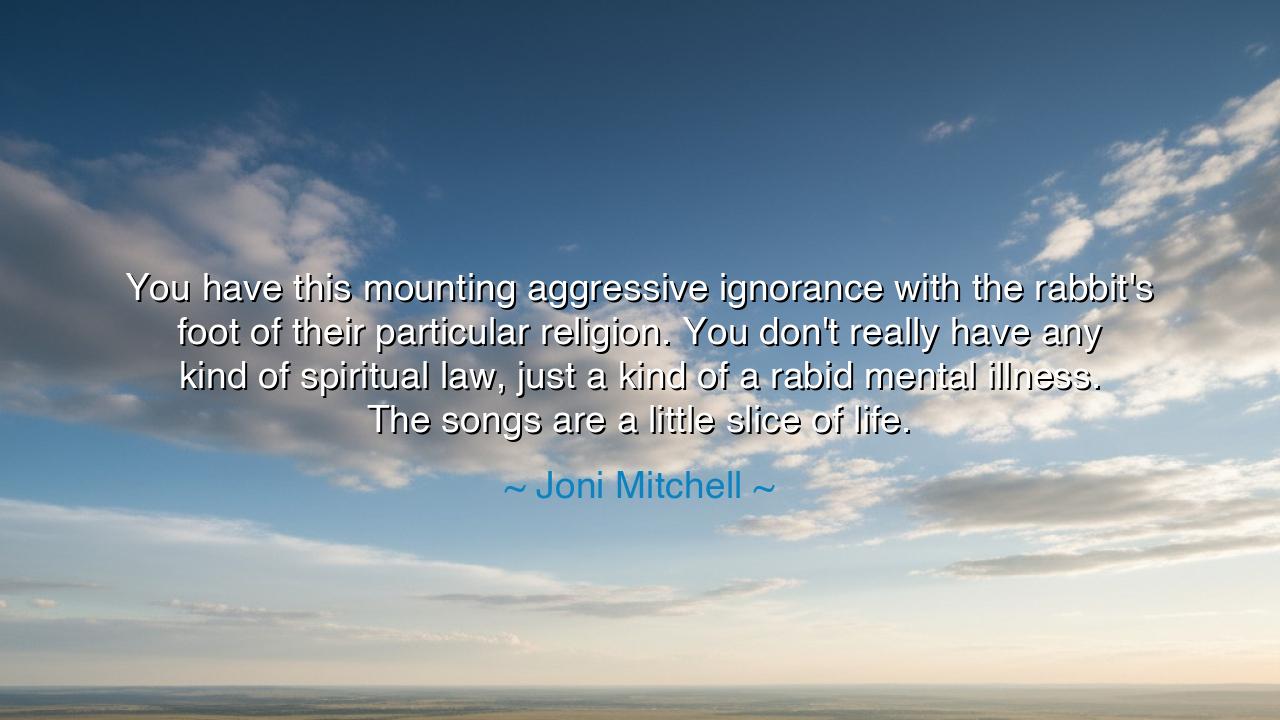
You have this mounting aggressive ignorance with the rabbit's
You have this mounting aggressive ignorance with the rabbit's foot of their particular religion. You don't really have any kind of spiritual law, just a kind of a rabid mental illness. The songs are a little slice of life.






In the windswept sands of human existence, where ideas and ideologies clash like the crashing of waves against the shore, there is a certain wisdom in the words of Joni Mitchell: "You have this mounting aggressive ignorance with the rabbit's foot of their particular religion. You don't really have any kind of spiritual law, just a kind of a rabid mental illness. The songs are a little slice of life." Mitchell's words strike at the heart of religious fervor, of the blindness that can take hold when faith is wielded not as a force of understanding and compassion, but as a shield for ignorance and intolerance. She speaks of a growing aggressive ignorance, a state where beliefs are held not with reverence, but with the frantic desperation of those who cling to something without understanding its true essence.
Mitchell's comparison of religion to a rabbit's foot, an amulet often believed to bring luck, hints at a view of religion as something superstitious—something that offers comfort or protection, but not a true guide to spiritual growth. Just as a rabbit’s foot provides a false sense of security without any real power, so too does an unexamined or shallow faith fail to offer the deep wisdom and guidance that true spirituality demands. Religion, when reduced to mere ritual or blind adherence, can become an anchor to ignorance rather than a guiding light to truth. The rabid mental illness Mitchell speaks of refers not to a literal disorder, but to the fervor that can arise when beliefs are held so tightly, without the grounding of reason or understanding, that they drive individuals into extremism, making them see the world through a distorted lens.
Consider the ancient example of the Inquisition, a period in which religious authority was wielded as a tool of oppression, and people were persecuted not for their actions, but for their beliefs. The Catholic Church, once the guiding spiritual force in much of Europe, used the claim of divine authority to justify the torture and execution of those deemed heretical. In this way, religion—when divorced from compassion and understanding—became a weapon of ignorance, perpetuating violence rather than fostering peace. Joni Mitchell’s critique of such misguided belief serves as a warning against the dangers of dogma that stifles true spiritual growth and encourages intolerance.
In contrast to this aggressive ignorance, Mitchell also reflects on the beauty of songs as a way to express the human condition—a "little slice of life." Songs, like art and poetry, capture the essence of our existence in ways that transcend words and doctrines. They speak not of rigid rules but of the human experience, full of joy, sorrow, triumph, and loss. Music, in its purest form, does not seek to impose; it seeks to connect. The songs Mitchell refers to are a reminder that life—in all its complexity—cannot be reduced to simplistic beliefs or rituals. It is a symphony, a constantly evolving piece of art that defies easy interpretation, just as the human spirit cannot be confined by the narrow walls of dogma.
In this light, Mitchell’s words serve as a call to look beyond the confines of tradition and to embrace the deeper, more meaningful aspects of spirituality and life. The true spiritual law is not found in rigid doctrines or superstitions, but in the ability to feel, to question, and to grow. Spirituality, in its highest form, is a journey—one that requires openness, curiosity, and the willingness to confront uncomfortable truths. It is a living, breathing force that is not confined to books or rituals, but is found in the way we engage with the world and with one another.
Consider the life of Gandhi, who, while deeply rooted in Hindu philosophy, rejected the blind and oppressive aspects of religious orthodoxy in favor of a spiritual path defined by non-violence, truth, and compassion. Gandhi’s beliefs were not rooted in dogma or ritual, but in the deeper moral and spiritual principles that connect all human beings. His life was a testament to the idea that true spirituality transcends the narrow confines of any one tradition or belief system. Gandhi’s unwavering faith was grounded in his ability to question and expand his understanding, to reject superstition and instead embrace a religion of action, rooted in compassion and selflessness.
The lesson of Mitchell’s words is not to reject religion altogether, but to examine it with a discerning eye, to recognize the difference between true spirituality and the ignorance that often disguises itself as faith. It is a call to look beyond the narrow walls we build around ourselves and to seek the deeper truths that unite us all. The aggressive ignorance Mitchell speaks of can only be overcome when we learn to approach our beliefs with humility, to question them, and to allow compassion to guide us toward a more inclusive, more enlightened way of being.
Let us, then, take this lesson to heart. Let us engage with our beliefs—not as something to cling to out of fear or insecurity, but as something to explore, to understand, and to share in a spirit of unity and love. Let us allow our hearts to be moved not by the rigidity of tradition, but by the beauty of life, the ever-changing song of existence, and the truth that resides in each of us. Only then will we find a true path to spirituality, one that lifts us beyond the limitations of ignorance and into the boundless realm of understanding and compassion.






AAdministratorAdministrator
Welcome, honored guests. Please leave a comment, we will respond soon